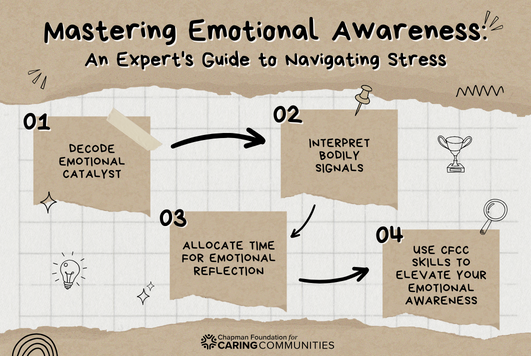
As the Content Leader for the Chapman Foundation for Caring Communities, I want to draw your attention to a recent study that I read that was written by the American Psychological Association. The study reveals that 41% of adults experience heightened stress during the holiday season. It’s a common pitfall – in the whirlwind of festivities and obligations, we often lose touch with our own emotional landscape and its impact on our interactions. To mitigate stress, present our best selves, and empathize with others, a heightened understanding of our emotional responses is critical. With our alumni in mind, I’ve put together a guide to navigating stress that includes several skills learned in two of our three foundational courses.
Elevating Your Emotional Awareness
In the midst of holiday chaos, maintaining emotional awareness may not seem like a priority, yet it’s paramount. Being attuned to our emotions prevents them from overwhelming us. It equips us with a deeper understanding of our emotional patterns, their catalysts, and how to express them constructively rather than reactively. So, how does one cultivate this emotional awareness? Let’s dig into some scientifically-backed strategies.
Strategies for Enhancing Your Emotional Awareness
1. Decoding Emotional Catalyst
In our course, ‘Our Community Serves’, we introduce the concept of ’emotional catalyst’ – specific stimuli that elicit an emotional response. These can range from physiological states (like hunger), certain words (such as “whatever” or “hate”), or specific behaviors (like being interrupted). Identifying your personal catalyst and the emotions they stir is a crucial first step toward enhancing emotional awareness.
2. Interpreting Bodily Signals
Interestingly, our body often recognizes an emotion before our conscious mind does. Have you ever noticed persistent headaches or a clenched jaw? Such physical manifestations could be your body’s way of signaling underlying emotional distress. Mindfulness techniques, such as those taught in ‘Our Community Serves’, can help decode these signals. Methods like deep breathing, changing your environment, or sharing your feelings with a trusted confidant can effectively alleviate stress.
3. Allocating Time for Emotional Reflection
In the heat of emotional moments, maintaining awareness can be challenging. Therefore, setting aside dedicated time daily to introspect on our emotions and what causes them can be tremendously beneficial. The Center for Leadership Studies offers an insightful guide with reflective questions designed to elevate your emotional awareness, both as an individual and a leader.
By adopting these strategies, not only can we navigate the holiday season with reduced stress, but we can also foster healthier relationships by understanding and managing our emotions more effectively. So, as we step into the festive season, let’s pledge to keep our emotional well-being at the forefront, ensuring we show up as our best selves for our loved ones and ourselves.
Below are a few tools that our team has put together to help you to be your best self during this holiday season.
